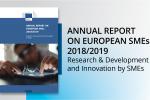
The National Documentation Centre (EKT) is participating in two of the European Commission’s Joint Research Centre working groups regarding smart specialisation and industrial transition. These initiatives are being implemented as part of the next programming and funding plan for national and regional actions for smart specialisation (2022-2030) (Research and Innovation Strategies for Smart Specialisation - RIS3) with the participation of working groups from EU regions and state agencies.
Smart specialisation initiative
The JRC smart specialisation initiative-RIS3 Support to Lagging Regions, was launched at the end of 2018 and aims to draw from and use experiences of the smart specialisation strategy implemented during the current programming period (2014-2020).
It also aims to identify actions that could be taken to further improve this process of implementation in the next programming period (2022-2030). In a broader context, the aim is to understand and strengthen the cognitive, scientific and technological parameters, which are able to give a robust indication of development in the various regional economies.
As the national statistical authority of the Hellenic Statistical System and being responsible for the production of national statistics for research, technology and innovation, EKT is the source for indicators of national and relevant regional strategies RIS3, the EPAnEK and the Regional Operational Programmes. The challenges in relation to monitoring and evaluation issues, namely the possible new metric dimensions of these policies in the next programming period (eg use of open data, the wider impact on local economies) are some of EKT’s areas of interest as participants in this initiative.
A further area of interest is strengthening the provision of documentation for relevant evidence-based public policy-making at national and regional levels through integrated informational platforms facilitating digital monitoring and governance. The initiative also gives EKT the chance to monitor and draw knowledge and experience from associated European organisations and to apprise the domestic system of relevant developments.
Industrial transition initiative
EKT is also participating in the JRC initiative for industrial transition ‘Understanding and Managing Industrial Transitions in Lagging Regions (Managing Industrial Transitions)’ which was launched mid 2019.
The reindustrialisation, that builds and exploits the cognitive, scientific and technological advantages of individual European regions, is getting increased attention in European policy as a key to sustainable economic development efforts. The main goal is to help individual European states and regions to switch from a de-industrialisation regime and poor utilisation of the factors of production to a productive industrial science and technology knowledge-intensive model, which takes account of international trends and developments.
Within the working group and in agreement with the respective central European policies the following are some of the industrial fields of interest that have been identified; electromobility, energy storage, digitisation and smart health. These are mega-technology industries, which include many different technological and industrial sectors.
The central role of EKT in the measurement and documentation of scientific and technological production in the country, reflected in dimensions such as highly skilled human resources, scientific publications, the high-tech enterprises, the competitive performance of European research, etc. are critical inputs to such an initiative. This is because the provision of objective evidence for the performance of the national innovation system, may be taken into account in defining and strengthening these individual technological and industrial sectors, where the country has a demonstrated ability and potential. Identifying these sectors will enable practitioners of relevant public policy at national and regional level to further strengthen it through appropriate public funding or other mechanisms.
















